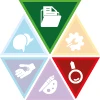Analyst

Analysts will often perform the following tasks:
- Identifying the underlying principles, reasons, or facts of information by breaking down information or data into separate parts.
- Using relevant information and individual judgment to determine whether events or processes comply with laws, regulations, or standards.
- Assessing the value, importance, or quality of things or people.
- Compiling, coding, categorizing, calculating, tabulating, auditing, or verifying information or data.
Strategist

Most strategists should excel at:
- Establishing long-range objectives and specifying the strategies and actions to achieve them.
- Analyzing information and evaluating results to choose the best solution and solve problems.
- Developing specific goals and plans to prioritize, organize, and accomplish your work.
- Scheduling events, programs, and activities, as well as the work of others.
Other work activities related to Clinical data managers
- Reading technical literature and participating in continuing education or professional associations for maintaining awareness of current database technology and best practices.
- Providing assistance and information to functional areas such as marketing, clinical monitoring, and medical affairs.
- Preparing appropriate formatting to data sets as requested.
- Evaluating processes and technologies, and suggesting revisions for increasing productivity and efficiency.
- Developing technical specifications for data management programming and communicating needs to information technology staff.
- Developing or selecting specific software programs for various researching scenarios.
- Contribute to the compilation, organization, and production of protocols, clinical study reports, regulatory submissions, or other controlled documentation.
- Writing working instruction manuals, data capturing guidelines, or standard operating procedures.







